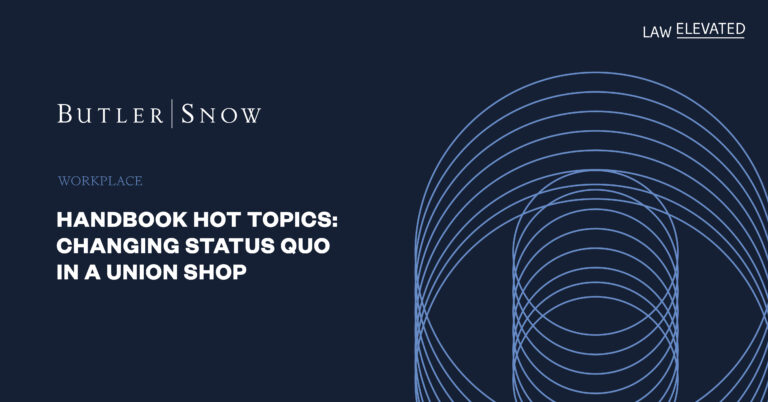Most employers are familiar with the general premise that employers with unionized workforces have a legal duty to bargain in good faith with their employees’ representatives. Section 8(d) of the National Labor Relations Act, or NLRA, sets forth what is encompassed within the duty to bargain collectively.
It provides that an employer and the representative of the employees must “meet at reasonable times and confer in good faith concerning wages, hours, and other terms and conditions of employment.”
However, some employers may not be as tuned in to their concomitant obligation to refrain from implementing unilateral changes, unless and until an overall impasse has been reached on that term and condition.
A recent administrative law decision, Fortune Media Corp. and NewsGuild of New York Local 31003, highlights this issue and serves as an important reminder for employers with unionized workforces who are considering implementing or making unilateral updates to employee handbooks.
In the Fortune matter, Fortune and the union were in the process of bargaining for a new collective bargaining agreement. Amid this negotiation, Fortune announced to the union that the company intended to publish an employee handbook. Fortune provided the union with a copy of the draft handbook for review.
Following the initial assessment, the union suggested changes and asked for additional time to review the handbook draft more thoroughly. Only a week later, Fortune emailed the handbook to all employees without incorporating any of the union’s proposed changes, and asked employees to read and acknowledge the policies.
The handbook expressly provided that many terms and conditions of employment set forth in the handbook might also be defined in the collective bargaining agreement with the union. It also noted that, where provisions in the handbook could not be harmonized with the collective bargaining agreement, the collective bargaining agreement would control.
The union contended that Fortune violated Section 8 of the NLRA by unilaterally changing the terms and conditions of the bargaining unit employees when it issued the handbook. Specifically, the union asserted that the employee handbook unlawfully announced:
- A documentation requirement for employee sick leave;
- Reimbursement to Fortune of any jury duty payments received by employees from the court;
- The elimination of the practice of providing severance pay;
- A reservation of the right to require employees to agree to the inspection of their persons, personal possessions and property, and personal vehicles parked on Fortune’s property;
- A prohibition on smoking and vaping during working time; and
- A requirement that all employees record their daily attendance.
The administrative law judge’s analysis of the handbook provisions in the Fortune case provides a helpful guideline for an employer to evaluate the legality of making a unilateral change in its employee handbook.
First, the judge considered whether each of the challenged handbook provisions concerned mandatory subjects of bargaining, which could affect employees’ wages, hours, or other terms and conditions of employment.
Not surprisingly, the judge found that each of the challenged handbook provisions affected an employee’s compensation, affected an employee’s rights or were otherwise germane to the working environment. As such, the judge easily determined that the challenged handbook provisions involved mandatory subjects of bargaining.
Having determined that the challenged handbook provisions involved mandatory subjects of bargaining, the judge then considered whether each of the challenged handbook provisions actually changed the status quo, or the baseline terms the employees enjoyed before the issuance of the handbook.
The judge noted that where an employer’s action does not alter the status quo, the employer does not violate Section 8 of the NLRA.
The judge found no evidence that Fortune had a policy of providing severance pay, and thus did not find that eliminating the severance plan changed the status quo. However, the judge found that the remainder of the challenged handbook provisions did, in fact, change the status quo.
Fortune admitted that prior to the issuance of the handbook, employees were not required to reimburse court jury payments, refrain from smoking or vaping outside during breaks, or record their daily attendance.
With regard to the remainder of the challenged handbook provisions — e.g., sick leave documentation and inspections — the judge found that Fortune could not provide evidence sufficient to establish that the challenged handbook provisions did not alter the status quo.
As a result, the judge held that the challenged handbook provisions, except for the severance elimination, did change the employees’ status quo.
Fortune then argued even if the challenged handbook provisions amounted to a change in the status quo, no violation occurred, since the changes were not enforced. The administrative law judge disregarded that argument. The judge held that the mere announcement of a change could adversely affect employees.
Specifically, the judge opined that a sick employee might not go to the doctor if she believes that she must submit medical documentation, an employee may feel compelled to submit to an intrusive search if he believes it to be required, and an employee might not take a smoke break if she believes it to be prohibited.
Ultimately, the judge held that the employees would reasonably assume the challenged handbook provisions were in effect, and that the changes to the status quo were more than de minimis. Accordingly, the judge held that Fortune violated Section 8 of the NLRA by issuing a handbook that unilaterally changed the terms and conditions of employment.
Given the risk of a potential violation of the NLRA, an employer must recognize that not only does it have an obligation to bargain, but it also has an obligation to refrain from making any unilateral changes to the terms and conditions of employment for its unionized workforce.
When in doubt about the legality of implementing a new or revised policy for a unionized workforce, employers should seriously consider whether it is a change to the status quo — and, if it is, negotiate with the union representative prior to distributing the revised policy.
This article originally appeared in Law360‘s Employment Authority as an Expert Analysis.
